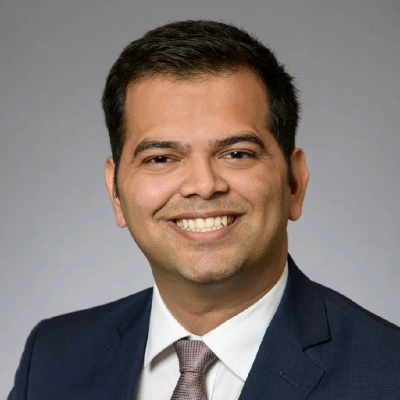22 Unconventional Career Moves That Defied Traditional Advice
Career advice often follows predictable patterns, but some of the most successful professionals have built their paths by doing the opposite. This article examines 22 unconventional career decisions that went against traditional wisdom, featuring insights from experts who made these bold moves themselves. From turning down promotions to abandoning stable positions, these real-world examples reveal how breaking the rules can sometimes be the smartest strategy.
Choose Education Over Predictable Corporate Advancement
I took the unconventional step of leaving my stable software engineering position at JP Morgan Chase in Mumbai to pursue graduate studies at the University of Arizona, despite many colleagues advising me to stay on my predictable corporate path. This decision meant facing significant uncertainty and working multiple jobs as a graduate assistant during the pandemic just to make ends meet. Looking back, choosing education and personal growth over immediate career advancement was difficult but transformative, opening doors to leadership opportunities I wouldn't have encountered on my previous trajectory. The short-term sacrifice ultimately provided a broader perspective that has proven invaluable in my current leadership role.

Restructure Your Business Rather Than Abandon It
When I faced severe burnout while managing multiple professional roles, conventional wisdom suggested I should pivot to a completely different field. Many colleagues advised that shifting to tech consulting would provide a fresh start, which is common advice for professionals hitting a wall in their current path. Instead of following this traditional guidance, I took the unconventional approach of deeply restructuring my existing business and building a stronger team around me. This decision required more short-term effort than simply switching careers, but it allowed me to address the root causes of my burnout rather than just escaping the symptoms. Looking back, this choice to refine rather than abandon my established expertise ultimately created a more sustainable career path and preserved the valuable industry knowledge I had spent years developing. The experience taught me that sometimes the best career moves aren't dramatic pivots but thoughtful evolutions of what you've already built.

Take a Strategic Break Without a Backup Plan
One of the most unconventional moves I made was walking away from a stable executive role to take a six-month break with no backup plan. Every mentor I had warned against it—"momentum is everything," "you'll lose relevance," "people don't hire gap years." But I wasn't burned out from the work itself; I was burned out from operating on autopilot. My calendar was full, but my direction wasn't.
That pause became the most strategic decision of my career. I spent those months consulting part-time, mentoring founders, and exploring industries I'd never touched before. It gave me perspective that no boardroom could. I stopped chasing titles and started focusing on impact—how to build businesses that scale sustainably, lead teams that think independently, and create strategies that serve both profit and purpose.
When I re-entered the market, I didn't come back as a candidate—I came back as a partner in growth. That break sharpened my pattern recognition, expanded my network in unexpected directions, and made me far better at identifying what truly moves the needle for clients and teams.
The lesson was simple: sometimes the riskiest career move isn't stepping away—it's staying put out of fear. Traditional advice tells you to climb the ladder. My experience taught me to check if the ladder's even leaning against the right wall. Taking time to pause didn't derail my trajectory—it recalibrated it. And that clarity has shaped every decision since.
Abandon Security to Build From Complete Scratch
I ignored the conventional advice to "climb the ladder" and stay in one lane. Instead, I left a secure path in academia and media to build a travel company in Chile from scratch—a decision everyone said was reckless. That move led me to run a business featured twice in The New York Times, host a TV show, and later build my consulting firm, Strategic Pete.
When political unrest in 2019 destroyed the tourism industry, I lost everything—my company, house, and team of 50. But that collapse forced me to rebuild smarter: smaller team, higher margins, no seasonality. It's the reason I now help CEOs create scalable, freedom-driven businesses.
The lesson: following the "safe" route might protect you, but it rarely transforms you. Leaving stability for uncertainty taught me resilience, adaptability, and how to build a business—and a life—that I actually control.

Pursue Freelance Work Over Stable Full-Time Positions
One unconventional step I took was turning down a stable full-time position to pursue contract and freelance work early in my career. Conventional wisdom—and most mentors—warned me that it was too risky, especially without an established client base or a predictable income. But I had this persistent sense that I'd learn more, faster, by exposing myself to a variety of projects, industries, and people rather than settling into a single role too soon. It felt like a gamble, but one that aligned with my long-term goal of building a versatile and independent career.
In the beginning, it was challenging. There were months of uncertainty, and I had to wear multiple hats—writer, marketer, negotiator, accountant. But over time, that experience became my biggest advantage. I built a portfolio that was far more diverse than it would have been in a traditional path, developed a sharper sense of client needs, and learned how to adapt quickly to shifting demands. Most importantly, I discovered my niche and voice much earlier than I might have in a single company setting.
That unconventional decision gave me autonomy, resilience, and a network that continues to open doors. It taught me that traditional advice often aims to minimize risk—but sometimes, embracing calculated risk is exactly what accelerates growth and defines your unique career trajectory.

Switch From Finance to Marketing Despite Security
When considering my career trajectory, I made the unconventional decision to leave my established position as a Wall Street Financial Analyst to pursue marketing, despite traditional advice suggesting I stay in finance for security and established advancement paths. This transition was sparked by a friend's insightful observation about where my true passions and talents lay - in advertising, event planning, and promotions. Taking this leap required significant learning and adaptation, but ultimately led to a fulfilling and successful career in marketing that aligned with my natural interests and strengths.
I started my marketing career at Fortune 500 firms like P&G and Coke with large established brands and big budgets then pivoted again to marketing at VC-backed tech startups no one had ever heard of. I became effective at guerrilla marketing helping smaller brands get noticed and all of those firms had positive exits. My trajectory taught me how to be a big fish in a small pond which has been very helpful now as an entrepreneur. Although some people thought it was risky to leave a lucrative career in finance for corporate then leave the security of a steady paycheck for the ups and downs of the startup world but for me it lead to a much more fulfilling and interesting career path.
I work with and for people I respect who share my core values and we creatively solve problems leaving the world better than we found it. How I measure success has changed a lot over the years. Instead of looking at finish lines like numbers, job titles, houses or cars, or a level of public profile, I factor in things like whether I get to do work that at least sometimes lets me feel like I made a genuine difference in the lives of other people. To me, growth for growth's sake is meaningless, but profitable growth with interesting clients solving important problems is what keeps me engaged and excited. Creating an environment where your employees and customers feel valued and appreciated makes me feel proud that I have built a successful business. I am fortunate to work because I want to and enjoy it, I have the luxury of having a great boss and have created a platform to do work that inspires me and leaves time for fun too. To me that is success. It has been a journey to get here but I am lucky to have found it. I love the autonomy, flexibility and the fact that I know every day the impact that I have on my business.

Build a Remote Company Before It Became Popular
I chose to build an entirely remote company a long time ago, when remote work wasn't in vogue, despite prevailing advice that proximity was important to foster effective collaboration. It gave me access to a global pool of talent and allowed me to foster a culture of outcome over face time. It not only spurred our growth but also gave us flexibility and resilience to rapidly adapt to new market trends, proving that unconventional paths have a tendency to lead to long-term competitive bounds.

Share Messy Drafts and Failures in Public
I published my work-in-progress notes and failures in public, against advice to only show polished wins. I shared experiments, messy drafts, and what I would try next, with real metrics and screenshots scrubbed for privacy. That transparency drew mentors, speaking invites, and steady inbound work, because people could see my judgment, not just results. It also sped up learning, since helpful strangers pointed out blind spots I missed.
If you try this, set clear guardrails on what you cannot share, then document everything else. Show your baseline, what you changed, and the outcome, even if it flops. Invite critique, respond with data, and keep a simple cadence, like one post a week. Over time, you will build proof of thinking, not just a highlight reel.

Step Down to Gain Essential Technical Skills
We're often told that a career is a ladder, where the only direction is up. The pressure is to constantly seek the next promotion, the bigger title, the larger team. This creates a powerful forward momentum, but it can also create a kind of tunnel vision, where we value movement over mastery. We become so focused on climbing that we forget to check if the ladder is leaning against the right wall, or if our own foundation is strong enough to support the weight of where we're headed.
The most valuable unconventional step I ever took was to deliberately step off that ladder. Early in my career, I was on a management track and was offered another promotion. But I knew I had a fundamental gap: I was managing people doing technical work that I didn't truly understand from the ground up. Instead of taking the promotion, I took a "lesser" role at a different company—an individual contributor position with no direct reports. My mentors were confused, warning me that it would look like a demotion and kill my momentum. But my goal wasn't a title; it was to gain a bedrock skill that I knew would be essential for authentic leadership later on.
I think about a client I coached, a brilliant project manager who was terrified of public speaking. She kept turning down opportunities that would put her on a stage. Traditional advice would be to join a club or take a course. Instead, she volunteered to coach her daughter's elementary school debate team. For six months, she wasn't a professional trying to overcome a fear; she was a mom helping ten-year-olds build an argument. She was so focused on them that she forgot to be scared for herself. That sideways step, seemingly unrelated to her career, did more for her confidence than any corporate workshop ever could. It's a good reminder that growth often happens when we're not looking at the ladder at all.
Decline Promotion to Master the Work First
One unconventional move I made was turning down a management opportunity early on because I wanted to keep learning in the field. Most advice says to take promotions as soon as they come, but I knew I wasn't ready to lead people without understanding the work inside out. Instead, I spent a few more years side by side with technicians, solving tough service issues and learning how every part of the business operated.
That decision slowed my title growth at first, but sped up everything that came later. When I eventually stepped into leadership, I had credibility and firsthand knowledge that made it easier to earn my team's trust. It taught me that sometimes the smartest career move is to wait—especially if you're using that time to build depth instead of just climbing fast.

Reject Lucrative Clients With Misaligned Values
The most unconventional decision I ever made was walking away from that huge six figure client, the kind of deal that people would kill for. Problem was, it just didn't feel right for my company, the values just didn't align.
Usually, the advice you get in business is hang on to clients no matter what. But i figured taking the hit in the short term, walking away from that big contract would create some breathing room for my team to do some real meaningful work. We were free to pick the projects that really suited us where our strengths were being used & matched with real vision
It was a turning point really. That decision allowed us to find people who were just a better fit for us. People who 'got' us. The outcome was a much more stable, more satisfying business, and we ended up with people who really appreciated us & our work

Refuse Promotion to Master Structural Expertise
The unconventional step I took toward my career goal was deliberately rejecting administrative promotion to remain the lead hands-on foreman for three extra years. Traditional advice warned against this, saying I was creating a massive structural failure in my career trajectory by delaying executive titles and income. I faced a clear conflict: the perceived prestige of management versus the verifiable skill of structural expertise.
I made the decision because I realized that the true structural vulnerability in our growing company was a lack of institutional knowledge at the hands-on level. By staying in the field, I committed to mastering the most complex heavy duty structural problems—advanced thermal auditing, large-scale custom flashing—becoming the undisputed expert in structural problem-solving. This trade-off sacrificed abstract title progression for guaranteed, verifiable competence.
This decision ultimately impacted my career by making me indispensable. When I finally moved into the executive role, I possessed deep, unimpeachable structural competence that no administrative manager could challenge. My authority as a leader was anchored in my superior, hands-on knowledge of the actual product and process. The best way to achieve a career goal is to be a person who is committed to a simple, hands-on solution that prioritizes securing maximum verifiable structural competence over chasing abstract titles.
Leave Corporate Strategy for Early-Stage Startup Uncertainty
I quit a steady corporate strategy position and went to an early-stage analytics startup at a time when most colleagues told me that I was making a mistake to leave predictable progress to uncertainty. The trade-off appeared to be reckless on paper, no brand name, little resources, and long learning curve in all aspects of operations, product and client management. But what an immersion reduced years of experience to months. I got to know how to process data as a dynamic system and relate it to behavior, context, and time.
At the time when the company was purchased, such cross-functional fluency turned out to be my biggest asset. It swapped me around as a specialist to a strategist and I am now able to navigate technical and executive sides with equal ease. The traditional avenues tend to develop but restrict the scope. Getting out of the track widened mine and reconstituted my understanding of professional growth not in terms of title advancement, but flexibility acquired.

Launch Your Business Earlier Than Advisors Recommend
One unconventional move I made was starting my own pest control business earlier than most people thought was wise. The traditional advice was to wait—get more years of experience, build more savings, and play it safe. But I knew the timing would never feel perfect, and I saw a real need for a more customer-focused approach in the Austin market. So, I took the leap with what I had, even though it meant long hours, financial risk, and learning a lot on the fly.
That decision completely shaped my career. The early challenges forced me to grow faster as a leader and problem-solver, and it taught me how to build a business from the ground up through persistence rather than perfection. Looking back, I'm glad I didn't wait for the "right time." Sometimes, the best opportunities come when you trust your instincts and move forward before everything feels ready. It's what set the foundation for everything Absolute Pest Management has become today.

Pause All Growth to Fix Internal Systems
One move that went against every bit of traditional advice was saying no to growth for a full quarter. Everyone around me said to take every new client we could, but I hit pause instead. Our team was stretched thin, and I realized adding more business without fixing our systems would burn us out. So, we focused entirely on refining our process—everything from training to communication—before scaling again.
It felt risky at the time, but that decision ended up being the turning point. When we reopened to new clients, retention shot up, and customer satisfaction scores climbed with it. The lesson? Sometimes, the most unconventional step toward growth is knowing when not to grow.

Build Your Entire Company Around Personal Values
Everyone told us not to mix business with personal values. "Keep it professional," they said. We did the opposite—we built our entire company around them. We talked openly about faith, community, and giving second chances through owner financing. It was risky. Some thought it'd turn buyers away.
Instead, it did the opposite. It attracted people who shared those same values and wanted to work with someone real, not polished. Sales grew, but more importantly, loyalty did. The lesson? Authenticity might narrow your audience, but it deepens your impact. Sometimes breaking the "rules" just means remembering who you are before the world tells you how to sound.

Accept Lower Pay to Align With Purpose
I took a pay cut to move into a role that felt closer to my purpose. Everyone told me it was a mistake—wrong timing, bad financial move, too risky. But that decision changed everything. It put me in a space where my work mattered again. At Sunny Glen, that meant trading corporate comfort for community impact. The hours got longer, but the fulfillment hit deeper. That step backward on paper became a leap forward in meaning. Sometimes the unconventional move isn't about strategy—it's about alignment. And once your work lines up with your values, everything else starts to make sense.

Leave Hospital Administration for Direct Primary Care
Choosing to step away from hospital administration and launch a Direct Primary Care practice ran counter to nearly every piece of conventional career advice in medicine. Many peers viewed it as abandoning stability for uncertainty. Yet that decision reshaped the entire trajectory of my work. Without insurance constraints dictating visit lengths or treatment options, I regained the freedom to practice medicine as it was meant to be—personal, preventive, and deeply relational. Financially, the shift demanded discipline early on, but it created long-term sustainability through predictable membership revenue and dramatically lower overhead. More importantly, it restored professional satisfaction. Every advancement since—whether integrating telehealth, improving chronic care management, or expanding patient education—has grown from that single choice to reject a traditional model and prioritize autonomy over convention.

Abandon Stable Employment to Pursue Ministry Work
Choosing to leave a stable full-time position to pursue ministry work through creative arts went against nearly every piece of traditional career guidance. The decision meant stepping away from predictable income and clear advancement for something uncertain but deeply aligned with purpose. In the early months, it felt reckless. Yet the freedom to merge faith, storytelling, and community outreach opened doors that structure alone never could. Collaborations with musicians, filmmakers, and local ministries grew naturally, each project shaping a clearer sense of calling. The risk created space for authenticity to lead, not security. That shift redefined success from professional stability to spiritual resonance—an outcome no conventional plan could have promised.

Prioritize Balance Over Traditional Hustle Culture Mindset
When I first transitioned to entrepreneurship, I made the unconventional decision to prioritize balance and sustainability over the traditional "hustle culture" mindset that dominates business advice. Despite conventional wisdom suggesting success requires constant work and sacrifice, I completely redesigned my business around steadiness and personal capacity. This approach allowed me to recognize that my nervous system is actually my greatest business asset. The result has been sustainable growth without the burnout that derails so many entrepreneurs, proving that sometimes the best path forward requires questioning established business practices.

Refuse to Delegate Critical Quality Control Tasks
The unconventional step I took was enforcing a Zero-Delegation Protocol on high-value operational tasks early in my career. Traditional advice advocates for delegation to scale output, but I chose absolute personal ownership of critical assets.
Specifically, I refused to delegate the final quality control of high-value, incoming inventory, such as OEM Cummins Turbocharger units. I personally verified the authenticity and condition of every single unit for over a year, treating each check as a mandatory technical examination. This required excessive hours and violated the standard management principle of maximizing supervisory time.
This decision ultimately impacted my career trajectory by establishing the Operational Integrity Precedent. I did not just gain domain knowledge; I became the non-negotiable subject matter expert in asset verification. My reputation was built not on managing people, but on guaranteeing the OEM quality of the product before it entered the system.
This firsthand, granular expertise in asset risk made me indispensable. My marketing strategy—the 12-month warranty guarantee—is entirely backed by the verified protocols I personally established. I proved that for high-stakes products like heavy duty trucks components, proximity to the asset dictates the authority of the leader. I converted time spent into verifiable, non-abstract competence.

Embrace Job Hopping Despite Strong Advice Against It
I can certainly answer this one, as a senior software developer with 10+ years of commercial experience.
I started my career in '17. Back then, the employment market was red hot. However, recruiters still strongly advised against job hopping, as well as colleagues, saying it's a safer not to do it and I can easily find myself out a job if my CV is full of gaps and 6-month long employments. I knew the demand for software developers (pre-AI) was crazy back then and I think they didn't fully realise that there were simply too many empty seats. So I rolled the dice. My first graduate job I spent 6 months, then a few months at 2 different startups and another big enterprise for 6 months. After just 16 months, I became a contractor/independent consultant, and to this day, I never had to go back to permanent employment.
The end result? I am in the top 1% of my profession across the continent, very well paid (although the market is certainly not easy right now), and have lots of day-to-day flexibility. I have also founded a successful B2C AI startup.
I'd say the key is to take risks. If you are smart enough, and work hard enough, you will figure it out. No matter the environment or labour market.





